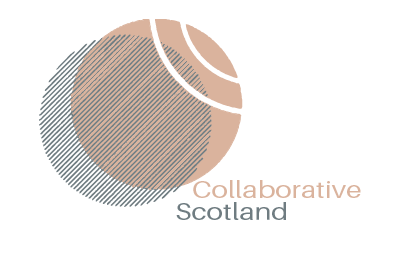On 21st May, Collaborative Scotland held a “Dialogue on the Future of Scotland” at the excellent Edinburgh Training Centre. The event combined an exploration of the processes that can help facilitate a more productive exchange with the opportunity to touch on some of the issues of substance concerning the forthcoming referendum. It also provided participants the opportunity to consider issues from a different perspective by standing in others’ shoes.
A critical starting point of any dialogue is the opportunity to build rapport, not least to allow the people to be separated from the issues and the foundations of trust to be laid. The evening began with each table of five or six people introducing themselves to each other and saying something about their hopes for the discussion and their concerns about the referendum, which a more respectful dialogue might be able to help address. The opportunity to share food also played a part in building rapport and humanising the proceedings.
Many of the emerging worries that participants shared concerned the aftermath of the referendum
– possible schisms in families, friendships and communities, a sense of loss given the emotional investment in the campaign, the impact of an overly triumphal reaction by the ‘winners’ and the need for reconciliation.
Other concerns included: overly simplistic arguments about extremely complex issues, the impact on the rest of the UK and a lack of candour about the difficulty of answering questions which are just unknowable at this stage of the process.
It was felt that the nature of the discussion that precedes the referendum can play a part in addressing these concerns. In part this is down to language and de-personalisation and in part to the structure and processes that frame the discussion. The latter part of the evening focused on this by inviting participants to role play different groups of stakeholders. After a brainstorming and vote, five stakeholder groups were identified – interestingly, each group will not be directly involved in the referendum vote, but all will be influenced by the outcome. The groups chosen were: children in Scotland under voting age, Catalonia, UK-wide charities, the north of England and the EU Commission.
The participants were randomly divided into each group and asked to address a number of questions which centred on; what are your interests in relation to the referendum? what risks do you foresee? what are your concerns? what opportunities might present themselves and what hopes do you have?
The representatives were then brought together for a facilitated discussion. Specific attention was paid to the ground rules (e.g. confidentiality, reporting back, order of speaking etc.) with opportunities to reflect on what worked and what could be improved.
At the end of the evening the group as a whole took the opportunity to highlight key learning points. These included:
• There is a very wide and disparate set of stakeholders that have an interest in the referendum and the way in which the dialogue leading up to it is handled
• The way in which the process is structured and conducted can play a key role in determining the outcome and the nature of the discussion (“calm or hot”)
• Facilitation which helps achieve productive outcomes is a form of leadership
• Process management is hard work for facilitators and for participants, requiring concentration and engagement
• There is a very big difference between dialogue (which explores interests, hopes and fears) and debate (which encourages advocacy for and against positions)
• Dialogue enables conversations that matter and the building of collective wisdom
A lot of ground relating to both content and process was covered in a relatively short period of time. There was much that can be built on in many forums between now and September. We all have opportunities to help facilitate more productive dialogue.
